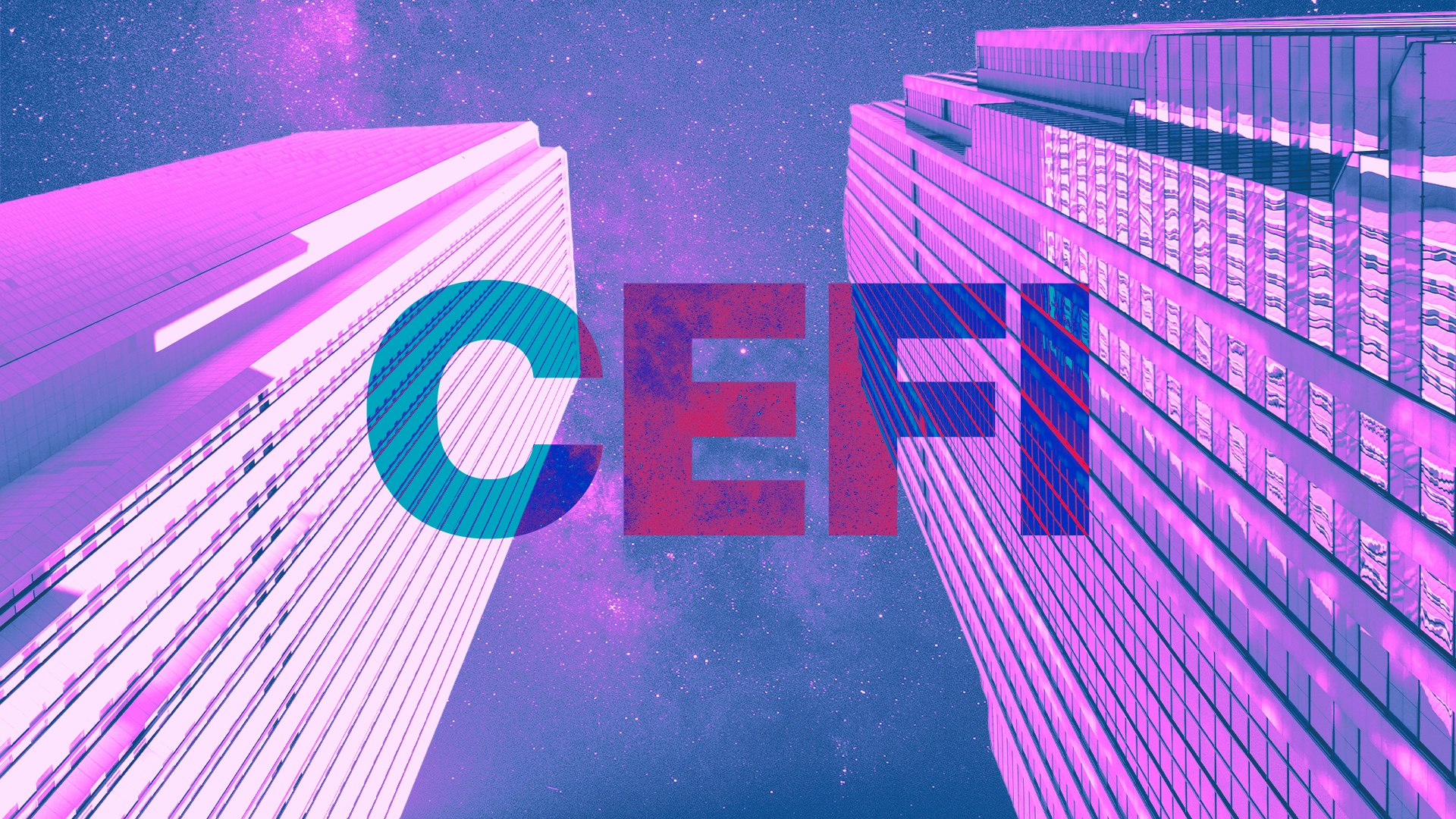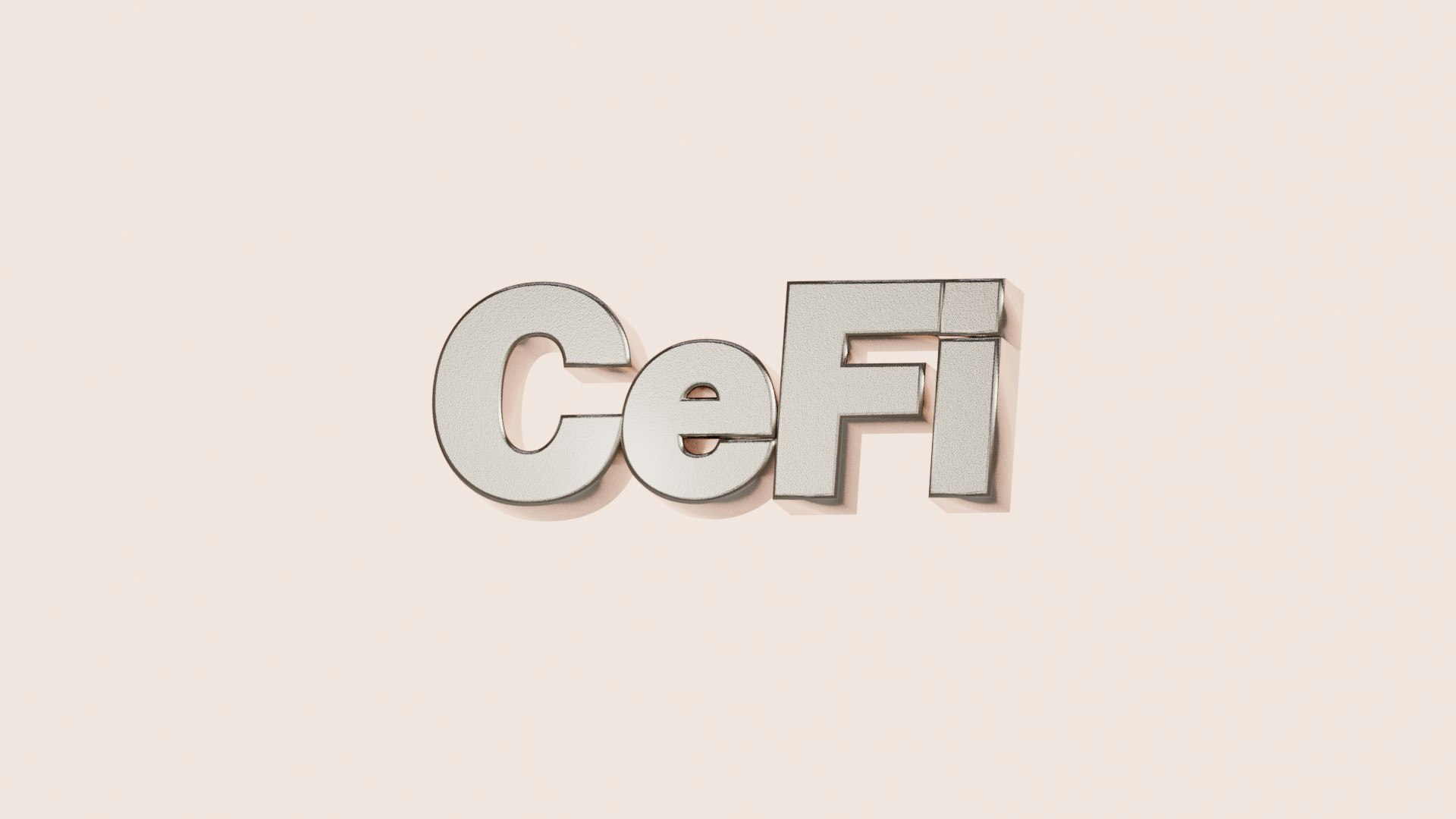Don’t invest unless you’re prepared to lose all the money you invest. This is a high‑risk investment and you should not expect to be protected if something goes wrong.
What is CeFi? Understanding Centralised Finance
What is CeFi or centralised finance? It’s a new industry that is a spin-off from the growth of cryptocurrency. Let’s talk about it!
In this article...
- CeFi vs. DeFi: What's the difference?
- Explore the world of centralised finance.
- Is CeFi the right choice for you?

New ideas like CeFi, DeFi, and CeDeFi, in have completely changed the financial industry.
In the cryptocurrency world, CeFi is short for centralised finance. CeFi platforms offer financial services like investments, loans, and savings accounts.
What is CeFi?
CeFi is a financial system that uses cryptocurrency and blockchain technology to provide traditional financial services.
Unlike DeFi (Decentralised Finance), which operates in a decentralised manner, centralised finance platforms are centralised. This means there’s a single entity (like a company or group of developers) that controls the platform and user funds.
When you use a centralised finance platform (e.g., a centralised cryptocurrency exchange), you trust intermediaries to safeguard your assets and facilitate transactions.
CeFi platforms are often preferred by beginners due to their familiarity, user-friendly experience, and integration with fiat currencies.
Here are the features of CeFi
-It relies on trusted intermediaries (custodians) to manage user accounts and execute transactions.
-Platforms are subject to government regulations, which can vary by country.
Note the standard risk warning at the bottom of this article.
-Platforms use a level of protective measures such as cold storage, encryption, and multi-factor authentication. Some features being online mean there is a risk that it may be a victim of a cyberattack. Cold storage is often referred to as "cold wallets” (like Ledger or Trezor) and these are effective for long-term storage as they are offline and difficult to hack.
-They charge fees for services (e.g., trading fees, withdrawal fees).
-Platforms allow you to buy/sell cryptocurrencies using fiat currencies (e.g., Pounds, Australian dollars, euros).
-Platforms offer enhanced liquidity, making it convenient to trade various cryptocurrencies without significant price slippage. CeFi platforms support a wide range of coins.
-Customer Support: Platforms often offer customer support.
-Compliance: Completing KYC (Know Your Customer) processes ensures compliance with local regulations such as in the UK.
-Some CeFi platforms offer interest on deposited funds.
How does CeFi differ from DeFi?
CeFi operates in a centralised manner, where a single entity controls all financial transactions and decisions.
DeFi is a financial system that works without a central authority, operating in a decentralised way.
What is CeDeFi?
The centralised-decentralised finance system, or CeDeFi, combines the benefits of both CeFi and DeFi into one hybrid system.
Some CeDeFi platforms offer “earn” products which lets users earn interest on their cryptocurrency holdings.
These platforms provide centralised financial services within decentralised finance applications.
What are the Advantages of CeFi?
One of the advantages of CeFi is its user-friendly interface and consistent customer service. CeFi platforms, supported by big companies, have systems which aim to reduce instances and to prevent market manipulation and price swings.
They provide a much more positive customer experience than decentralised platforms.
Investors generally have a better user experience using CeFi platforms with additional protection features such as two-factor authentication and cold storage.
Who operates in the CeFi ecosystem?
In centralised finance (CeFi), key players are centralised exchanges, and other financial institutions offering services such as lending and trading.
These platforms operate with centralised control and differ from their decentralised counterparts. An example is . They offer loans, where users can also use their crypto as collateral.
How does CeFi work?
CeFi relies on intermediaries (such as exchanges) to manage assets and facilitate transactions.
These centralised authorities offer services, act as custodians of funds, and ensure the stability and protection of the financial system.
CeFi platforms are usually heavily regulated by government authorities and regulatory bodies.
Strict rules, including anti-money laundering (AML) and know your customer (KYC) requirements, help prevent illicit activities.
Examples of CeFi services
Cryptocurrency exchanges like CoinJar, Binance, and Kraken operate as CeFi services. They maintain asset custody and control private keys associated with cryptocurrency wallets.
The Role of centralised exchanges
Centralised exchanges are crucial in the cryptocurrency market. They simplify the process of trading cryptocurrencies for users. Additionally, they help provide liquidity in the market. They also act as custodians of the cryptocurrencies held in their platform, ensuring their protection. This is a virtual platform and may be at risk of hacking.
However, critics often criticise centralised exchanges for their centralisation, which contradicts the decentralised nature of cryptocurrencies.
Savings and investment products
In CeFi, savings and investment products allow people to invest in cryptocurrencies and offer the opportunity to earn interest on their cryptocurrency assets.
Crypto savings accounts, staking, and yield farming are a few of the more well-liked savings and investment products in CeFi.
CeFi lending and borrowing
CeFi lending allows investors to earn interest on their cryptocurrency, similar to traditional savings accounts. Also, borrowing cryptocurrencies through CeFi can provide access to funds that may be difficult to obtain otherwise.
However, just like a bank, if a borrower doesn’t pay back a loan, their crypto they used as collateral is at risk, and they could lose it all. The platform has the right to liquidate their collateral if the loan isn’t paid.
Usually, the platform automatically sells a portion of the borrower’s collateral to cover the outstanding debt.
If the platform mismanages funds or goes bankrupt, borrowers and lenders are at risk.
For example, the now-defunct CeFi lending platform Celsius sank in 2022, thanks to poor risk management. Users suffered when the platform .
In another controversy, was an interest-earning program offered by the Gemini cryptocurrency exchange.
It allowed customers to earn annual interest on various cryptocurrencies supported by Gemini. Users could earn up to 7.4% interest on their crypto holdings. However, in 2023, Genesis, the platform that Gemini Earn was associated with, collapsed.
Affected customers will probably get up to 70% of their money back after legal proceedings, but nothing is certain.
The future of CeFi: Trends and predictions
With the rise of cryptocurrencies, we are likely to see more regulation of CeFi in the future. And we can expect continued growth in the use of decentralised finance (DeFi) platforms. These platforms have the potential to disrupt the entire traditional financial industry.
We can also probably expect the integration of CeFi and DeFi. As the two systems continue to grow and evolve, we may see increased collaboration between centralised and decentralised finance. This could lead to the creation of hybrid systems that offer the benefits of both worlds.
Conclusion: Understanding centralised finance (CeFi) in crypto
CeFi is a bridge between the traditional financial system and the decentralised crypto ecosystem.
Regulatory compliance and customer support are CeFi’s strengths. Users trust the platform to handle their funds in a protective manner.
The performance of crypto can be highly volatile, value can drop as quickly as it can rise. Past performance is not a guide to the future.

Frequently asked questions
What is CeFi and how does it differ from DeFi?
Centralized Finance (CeFi) platforms operate similarly to traditional finance institutions. They provide services like trading on centralized exchanges, often with lower transaction fees than their decentralized counterparts.
While CeFi platforms may offer some DeFi services, they lack the peer-to-peer functionality and open-source nature of DeFi protocols. Unlike the DeFi ecosystem, which relies on smart contracts for autonomous operation, CeFi platforms have centralized control and most offer dedicated customer service.

Suggested Articles
What is Bitcoin (BTC)? What is "Digital Gold" Used For?
What is Bitcoin? It is a digital currency that can be traded, exchanged, and used as a form of payment independent of central banks and governments.What is Ethereum? What is ETH Used For?
Ethereum is a decentralised blockchain-based open-source software platform that allows for the development of decentralised applications (dApps).What Is Crypto? How do Cryptocurrencies Work?
Crypto has become incredibly popular. But how does this digital currency work? And are there cryptos other than Bitcoin?Browse by topic



Cryptoassets traded on CoinJar UK Limited are largely unregulated in the UK, and you are unable to access the Financial Service Compensation Scheme or the Financial Ombudsman Service.
We use third party banking, safekeeping and payment providers, and the failure of any of these providers could also lead to a loss of your assets. We recommend you obtain financial advice before making a decision to use your credit card to purchase cryptoassets or to invest in cryptoassets. Capital Gains Tax may be payable on profits.
CoinJar’s digital currency exchange services are operated in the UK by CoinJar UK Limited (company number 8905988), registered by the Financial Conduct Authority as a Cryptoasset Exchange Provider and Custodian Wallet Provider in the United Kingdom under the Money Laundering, Terrorist Financing and Transfer of Funds (Information on the Payer) Regulations 2017, as amended (Firm Reference No. 928767).
Apple Pay and Apple Watch are trademarks of Apple Inc. Google Pay is a trademark of Google LLC.
This site is protected by reCAPTCHA and the and apply.